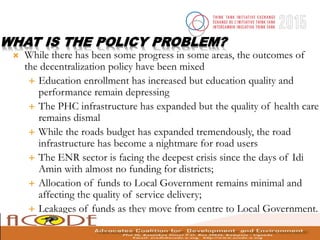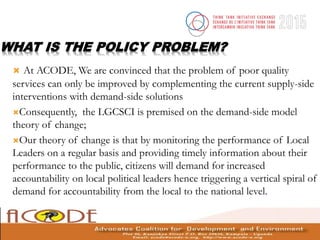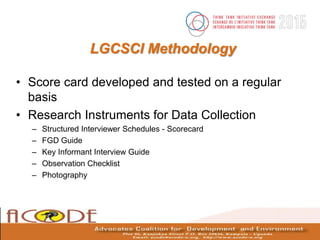Community Engaged Research_ACODE
- 1. February 18 – 20, 2015, Istanbul, Turkey Dr. Arthur Bainomugisha Executive Director –ACODE & Lecturer Makerere University COMMUNITY-ENGAGED RESEARCH
- 2. Structure of presentation What is ACODE? Background to Local Government Councils Score Card Initiative; Policy Problem; Theory of Change/Intervention; The assessment and who is assessed; Lessons learnt and Conclusion.
- 3. About ACODE • Established in 1999, ACODE is an independent public policy research and advocacy think tank based in Uganda but working in East Africa with operations in Southern Africa. • Through policy research, ACODE assists regional Governments and international development agencies expand the range of policy choices for development and governance.
- 4. The Local Government Councils Score Card Initiative (LGCSCI) “People want a form of government that is fully democratic and all embracing in terms of participation and benefit. It should be one where the leaders put the interests of the people above their own. Such a form should make leaders at every level fully accountable to the people who elect them” Report of the Uganda Constitutional Commission, 1992 LGSCI AND DECENTRALIZATION DEFICIT IN UGANDA
- 6. WHAT IS THE POLICY PROBLEM? The rationale of decentralization is to improve the delivery of public goods and services and deepen democratization by: Empowering local governments to engage in localized planning and programme implementation Creating citizens’ control of government to enhance accountability through the democratic process
- 7. WHAT IS THE POLICY PROBLEM? While there has been some progress in some areas, the outcomes of the decentralization policy have been mixed Education enrollment has increased but education quality and performance remain depressing The PHC infrastructure has expanded but the quality of health care remains dismal While the roads budget has expanded tremendously, the road infrastructure has become a nightmare for road users The ENR sector is facing the deepest crisis since the days of Idi Amin with almost no funding for districts; Allocation of funds to Local Government remains minimal and affecting the quality of service delivery; Leakages of funds as they move from centre to Local Government.
- 8. WHAT IS THE POLICY PROBLEM? Imbalances in the current power configuration especially between the LG and the CG Distorted/unclear vertical and horizontal accountability relationships A disengaged citizenry without the requisite civic competence to demand for quality services and accountability for non- performance; Mismanagement of public resources/corruption; Rampant conflicts between Speakers and LC 5s and between the political and technical staff.
- 9. WHAT IS THE POLICY PROBLEM? At ACODE, We are convinced that the problem of poor quality services can only be improved by complementing the current supply-side interventions with demand-side solutions Consequently, the LGCSCI is premised on the demand-side model theory of change; Our theory of change is that by monitoring the performance of Local Leaders on a regular basis and providing timely information about their performance to the public, citizens will demand for increased accountability on local political leaders hence triggering a vertical spiral of demand for accountability from the local to the national level.
- 10. The LGCSCI Theory of Change • Monitoring the performance of Local Councils/Leaders and providing information about their performance to the electorate will lead citizens to demand accountability from their local elected officials. • This increased citizen demand, which CSOs and local governments will channel upwards to central government, will ultimately result in – a more responsive government – more effective service delivery – better performing local government officials – a more engaged citizenry
- 11. The LGCSCI Theory of Change
- 12. Strategy of the Local Government Council Score-card Initiative • Research and Scorecard analysis • Outreach and capacity building – seeks to identify key factors that inhibit the capacity of district councils to provide quality services to their electorate – help design appropriate remedial actions to be taken to improve performance. – Councilor’s Diary – Peer to peer exchanges • SMS platform • Intensive dissemination • Building a local network of research and advocacy CSOs and individuals (champions)
- 13. LGCSCI Research Methodology • Regional Balance • Length of existence • Model Districts • Perceived Marginalization
- 14. WHO IS ASSESSED? District Council; Chairperson; Speaker; Councillors
- 15. LGCSCI Methodology • Score card developed and tested on a regular basis • Research Instruments for Data Collection – Structured Interviewer Schedules - Scorecard – FGD Guide – Key Informant Interview Guide – Observation Checklist – Photography
- 16. LGCSCI Methodology Cont’d – Key Strength • Robust methodology • Multi-skilled team • Triangulation of methods – Key Limitations • Possibility of biases • Risk of bribery • District Executive Committee not assessed • Uniform treatment of all councillors regardless of area of coverage and special interest
- 17. ACHIEVEMENTS TODATE MoU with MoF Early releases of funds to districts; Improvement in monitoring of service delivery Quality of debates in Councils has improved Increased demand for LGCSI by other districts Increase from 10, 20, 26, 30 districts. Capacity building component- training, peer to learning and dairies; Minutes and Documentation of council deliberations has improved; Hostility towards the initiative has reduced; Civic awareness of citizens has increased; Peer to peer learning between districts- Nwoya- Kabarole; Gulu-Mbarara; Initiative has become a model for replication in other countries.
- 18. Thank You.

















